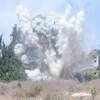
Accident reveals newly laid Israeli mines, UN says
26 November 2006
The Israeli army sowed landmines in south Lebanon during its summer conflict with Hezbollah in Lebanon, the United Nations said on 25 November. The claims came after British and Bosnian bomb disposal experts each had a foot amputated after a newly laid Israeli-made anti-personnel landmine exploded on Friday, according to a statement by the UN’s Mine Action Coordination Centre in South Lebanon (UNMACC SL). Israel has not yet established whether its forces laid landmines in Lebanon during its recent conflict, officials speaking on condition of anonymity at the Israeli Defense Force (IDF) told IRIN. Read more about Accident reveals newly laid Israeli mines, UN says








